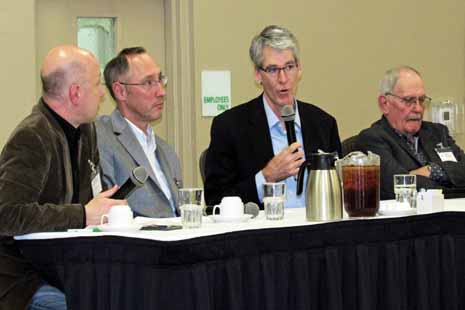Powder River Basin Resource Council (PRBRC) featured a panel conversation on Wyoming’s energy and economic future early in November at its Annual Meeting in Sheridan. Panelists included Rep. Mike Madden, Chair of the Wyoming House Revenue Committee; Rob Godby, Director of the Center for Energy Economics & Public Policy at the University of Wyoming; and Mark Haggerty, economist with Headwaters Economics, based in Bozeman, MT.
It was moderated by award-winning Wyoming independent journalist, Dustin Bleizeffer, who launched the discussion lauding PRBRC, saying Powder River is one of the “best government watchdogs in the state. “They demand government accountability and corporate accountability and transparency. They give voice to Wyoming citizens. Without them, we don’t have a functional government,” Bleizeffer asserted.
Professor Godby noted that coal is very challenged in Wyoming. Coal companies are “coming around to the fact that hydraulic fracturing has changed the energy landscape at least for electricity generation. We still produce about 40% [of coal-fired electricity] but the pie is much smaller.”
Haggerty talked about Dutch Disease: When a state or country is so dependent on minerals (or other natural resource) that all other sectors of the economy suffer. “In Wyoming, energy pays the bills,” he said. “When no other businesses pay, it discourages economic development and diversification.”
Haggerty cited the Oregon timber industry as an example. Rural Oregonians depended on federal payments for timber. When that industry declined, largely due to market forces, the communities relied on that sole source of revenue. They had never pursued any other economic development opportunities while they still had revenues. Now Oregonians are lobbying against public lands and national monuments [important economic drivers across the region] despite needing to diversify their tax base.
“You have to try to diversify your tax base while you still have revenue from minerals,” Haggerty advised the Wyoming audience.
Retired economics professor Rep. Mike Madden (R-Buffalo) stated that “if we don’t have a diverse fiscal system, we cannot diversify our economy.” He posed the question: “Are we politically flexible enough to deal with our tax structure?”
“I don’t know if we’re going to have the courage to do the right thing,” Madden said. “We can’t go on the way it is now with only one industry being taxed.” He suggested some economic sectors are not contributing to the tax base in proportion to the number of students they are generating for Wyoming schools.
Godby observed that low taxation doesn’t bring economic diversification. “Revenue diversification is even harder than economic diversification,” he noted.
Haggerty discussed the need for fiscal policies that will move economic diversification, noting that shifting from natural resource jobs to high wage services located in cities requires a certain level of education and work force, culture and finance. Remote, rural areas are not competing in the changing economy, but knowledge-based industries are.
He told the story of how Microsoft began in Albuquerque, but then moved to Seattle, where one of its founders, Bill Gates, wanted to be closer to family. The rest is history, as that helped transform a declining industrial city into one of the strongest economic centers in the U.S. He suggested Wyoming evaluate whether its permanent trust fund works as intended and whether the state uses these assets wisely.
He also cited the “well-coordinated response” of Northern Plains states after the North Central Power Study was published in the 1970’s to lay the groundwork for coal development and impacts with reclamation laws, coal leasing reforms, and severance taxes. PRBRC and its sister organizations in WORC were at that table and helped shape those plans.
“What can citizens do to guide our state?” PRBRC’s newly elected Chair Joyce Evans of Casper asked the panelists.
Madden noted that lawmakers hear mostly from the “cut and slash” advocates, but not much from “level headed” voices. “We are stuck in this old mentality that we’ve got to have low taxes so we can encourage business growth. That’s an old wives’ tale that doesn’t apply anymore,” he said.
Godby too advocated for change, saying “We have tied our hands behind our backs. Signing pledges not to do new taxes is not a solution. We must be willing to consider some tax changes.”
Haggerty quoted Milton Friedman, saying that “Change only comes in a crisis and when that happens, the solutions are cobbled together from the ideas that are lying around. We need groups like Powder River coming to the Legislature to argue for new and different ideas.“
PRBRC past-chair Bob LeResche shared his observations after a career in natural resource policy in Alaska, observing that the “need is still as pressing,” the answers are “elusive.”
“Our abject dependence on a single economic sector is still problematic,” he said. “The need remains to think truly outside the box, to acknowledge that fossil fuels are on the way out, to imagine the future, and to study all proposals’ economics unemotionally and apolitically.” He went on to emphasize the challenges, noting that many past efforts to address economic diversification have become “Grifter Magnets.”
Sign up for WORC blogs
WORC will send you a notice of new blog posts. You can sign up here.

